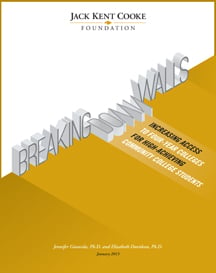JKCF in the News: Community College Daily
Transfer students can excel with the right tools
January 22, 2015
Community College Daily
 Many more community college students could eventually earn bachelor’s degrees if they have the right tools and opportunities to succeed, concludes a report from the Jack Kent Cooke Foundation.
Many more community college students could eventually earn bachelor’s degrees if they have the right tools and opportunities to succeed, concludes a report from the Jack Kent Cooke Foundation.
Most community college students want to complete a bachelor’s degree, but only 12 percent manage to do so, according to the foundation.
The report calls for community colleges to improve their transfer advising and urges four-year colleges and universities to expand their recruitment of community college students with successful academic records and provide better support to them after they’ve transferred.
Breaking Down the Walls points to the Cooke Foundation’s Cooke Scholars program – which provides grant aid and high-quality advising to students from less-advantaged backgrounds – to show that transfer students can excel if given the chance.
Overall, 97 percent of Cooke Scholars earn a bachelor’s degree within three years, and one in 10 graduates from the Ivy League. Yet, many Cooke Scholars are the first in their families to attend colleges and come from families with incomes well below the poverty level.
Since the Cooke Foundation launched its Community College Transfer Initiative three years ago, nearly 1,100 low- to moderate-income community college students transferred to eight participating four-year institutions where they attained a combined 3.0 GPA.
Rigorous academics
Improving the transfer process would benefit colleges, as well as students, the report states. Many community colleges have rigorous programs that prepare students for further study, so paying more attention to transfer students would validate those programs.
“It is anachronistic to think of community colleges as the weaklings of academia,” the report states, noting that more than 160 community colleges sponsor honors programs recognized by the National Collegiate Honors Council.
It lauds the Honors College at Miami Dade College (Florida), which combines rigorous academic standards, a global perspective, leadership and enrichment opportunities and one-on-one advising.
Outreach needed
The report recommends four-year institutions better support community college transfer students by:
- Partnering with community colleges to identify prospective students early.
- Ensuring students take the right classes.
- Appointing a campus point person for transfer students.
- Offering joint classes and summer academic programs.
- Providing workshops so students can learn what it takes to succeed at a four-year institution.
- Improving credit transfer policies.
- Developing social integration strategies, such as cohort activities and peer mentoring.
“We do ourselves a disservice as a society by denying gifted students the opportunity to fulfill their potential simply because their academic careers started at a two-year institution,” Harold Levy, executive director of the Cooke Foundation, said in a statement. “The message for both colleges and education policymakers is clear: Where a student began her studies should not ineluctably determine her entire academic career or her life chances.”